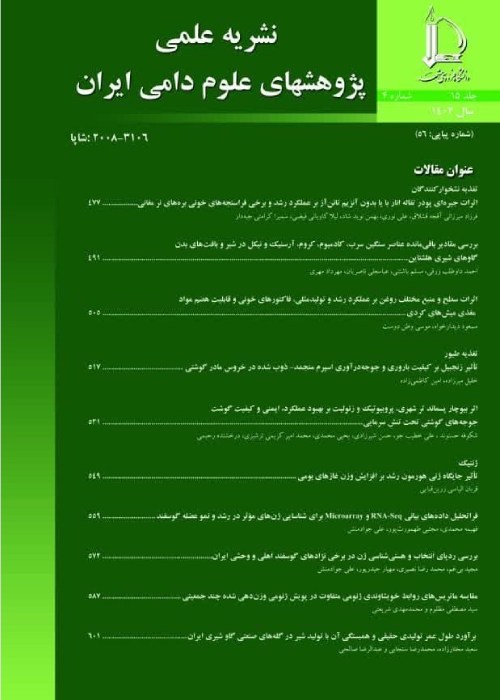Effects of Dietary Lysine and Betaine on Meat and Bone Characteristics of Broiler Chickens Under Cold Induced Ascites
Nowadays commercial broiler strains need more oxygen for the faster growth and higher meat production and are susceptible to ascites syndrome due to higher growth rate. Ascites is a metabolic disorder that causes the increased free radical production, decreased level of body antioxidant capacity and hence meat muscles destruction, pale color and lower quality. It damages the gut morphology and reduces the absorption of amino acids and minerals and as a result leg problems. Lysine and betaine are nature osmotic nutrients and control the water status in the absorptive cell and so protect the cell during the conditions of ascites. Thus lysine and betaine may help the synthesis of protein, lowering the carcass fat, change the oxygen needs and results in ascites in broiler chickens. Therefore, the purpose of this study was to investigate the effect of lysine and betaine on meat characteristics and bone condition of broiler chicks under cold induced ascites.
Three hundred one-day-old female chicks (Ross 308) were used by employing a completely randomized design with 4 treatments and 5 replicates (10 birds for each replicate) to investigate the effects of lysine and betaine alone or together on carcass quantity and quality of broiler chickens under ascites. The experimental diets were the control diet (corn-soybean basal diet without the supplement), 30% higher lysine than Ross 308 strain recommendation, 0.15% beatine and 30% higher lysine and 0.15% betaine. The dietary ingredients were analyzed for energy, crude protein and essential amino acids by NIR. All chickens were raised under cold stress from day 7 of age to induce the ascites. To induce cold stress, a temperature of 31 ° C was used in the first week but the temperature on 7, 14, and 21 days was reduced to 26 ° C, 20 ° C and 15 ° C, respectively After 21 days, it lasted from 15 ° C to the end of the period. At 42 days of age, daily intake and feed conversion and ascites mortality rates were calculated. Two bird from each replicate were randomly selected, weighted and slathered. After slaughter, the proportional weights of carcass, breast, thigh and right ventricle were determined with a precision scale of 0.001 gr. Moreover, thigh and breast meat samples were collected from the slaughtered birds and used for laboratory analysis of nutrients, acidity and the color indices. All the data were analyzed using the GLM procedure of SAS (Version 9.1) software. If there was a significant difference between the treatments, then the means were further compared by Tukey-Kramer range test at a 5% level.
The results showed that both the lysine and betaine alone or together caused the higher weight gain and the proportional weights of carcass, breast and thigh (P<0.05). Abdominal fat decreased by consumption of betaine alone or along with lysine (P<0.05). Both the lysine and betaine alone or together caused the decreased feed consumption, feed conversion, ascites mortality and right ventricle to total ventricle ratio (P<0.05). The moisture, crude protein, crude fat, ash of both breast and thigh meat were not affected by the experimental treatments (P>0.05). Moreover, thigh or breast meat pH and color indices (lightness, redness and yellowness) were not changed by dietary lysine or betaine supplementation (P>0.05). None of the experimental treatments affected the bone indices (ash, calcium and phosphorous) but the tibia diameter which was increased by dietary lysine supplementation (P<0.05). It seems that dietary lysine and betaine consumption in broiler chickens adjust the osmotic pressure in gastrointestinal cells and hence protect these cells under stress condition such as the cold situation of current experiment and thus help for the higher L-carnitine synthesis in body. The higher L-carnitine production results in lower carcass fat and greater protein synthesis and improved carcass efficiency (higher breast and thigh meat production). Consequently, body oxygen requirements and right ventricle to total ventricle ratio reduced and this causes the lower ascites mortality.
The consumption of betaine and lysine improves the performance, carcass quantity (increased carcass, and thigh and breast weights) and quality (decreased abdominal fat weight), and ascites mortality of broiler chickens. Moreover, no effects of lysine and betaine were detected on meat nutrient contents, pH and color indices and bone parameters.
Ascites , Betaine , Bone , Lysine , Meat color
- حق عضویت دریافتی صرف حمایت از نشریات عضو و نگهداری، تکمیل و توسعه مگیران میشود.
- پرداخت حق اشتراک و دانلود مقالات اجازه بازنشر آن در سایر رسانههای چاپی و دیجیتال را به کاربر نمیدهد.


